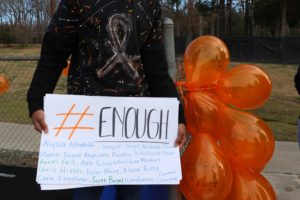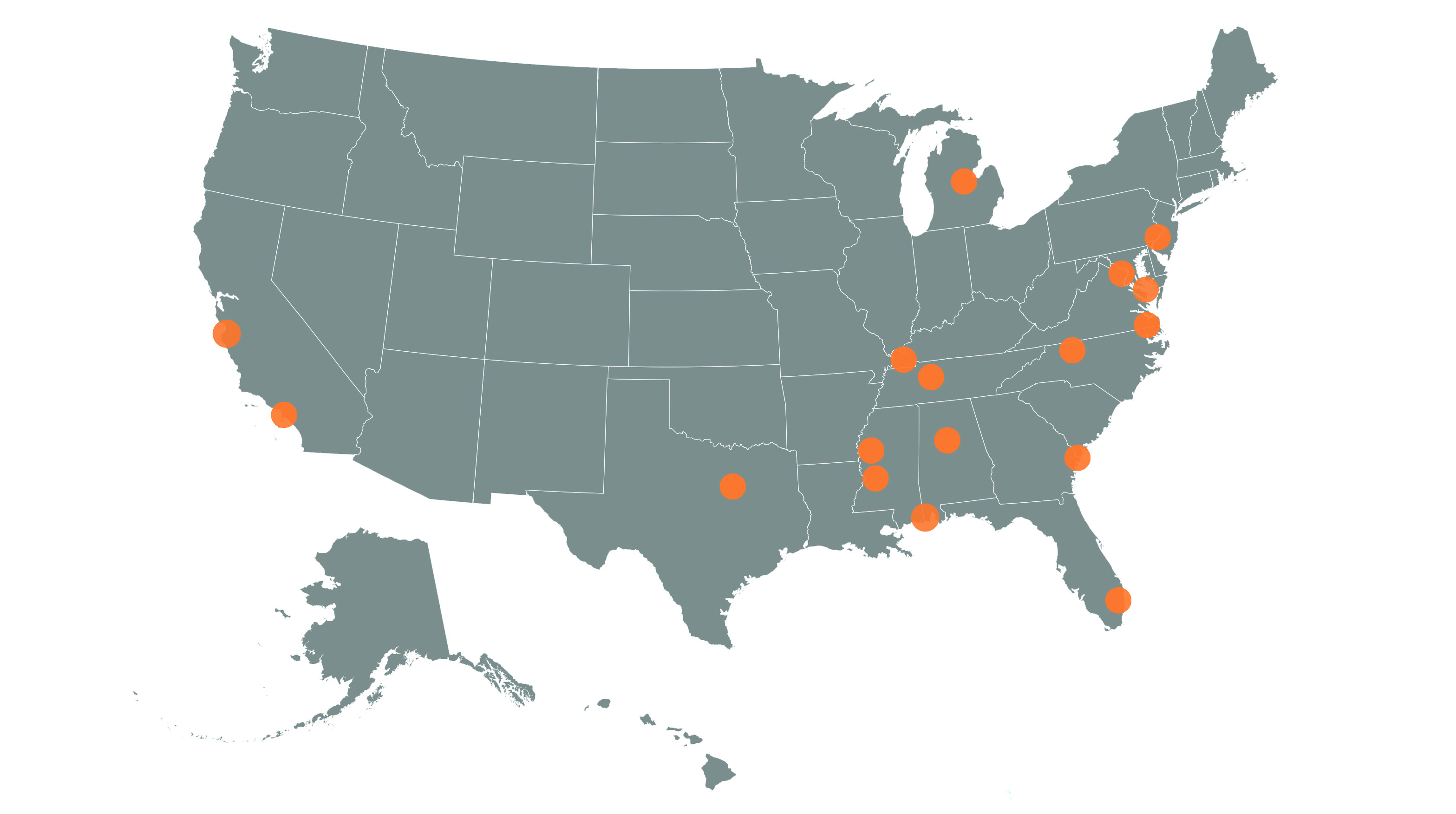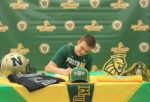According to CNN, there have been 17 school shootings in the first three months of 2018 in which someone was injured or killed on school grounds, not including the shooter. These shootings include gang violence, fights, domestic violence and accidental discharges. Their locations are marked above.
November 13, 2017, Northwood was placed under lockdown for approximately one hour and thirty minutes after a teacher heard what sounded like gunshots coming from between the math and world language pods. The lockdown happened before the start of the school day, a period of transition in which students and teachers were caught off-guard by the sudden chaos. While the shots heard were those of a hunter in the area and ended up being benign, this situation was a reality check for many members of the Northwood community.
“It could literally be any school today,” social studies teacher David Orphal said. “We had our own real lockdown here, and for me, I kept saying out loud and to myself, ‘It’s a hunter. It’s a damp morning. I’m sure that gunshot was much further away than it sounded.’ But inside, I was a little scared.”
February 14, the deadliest school shooting since the 2012 massacre at Sandy Hook Elementary occurred at Marjory Stoneman Douglas High School (MSD) in Parkland, Florida. Seventeen students and faculty were killed, and 14 others were taken to the hospital after the alleged shooter, 19-year-old former student Nikolas Cruz, opened fire on the school with an AR-15 style rifle that he obtained legally. The mass shooting in Florida changed the perspectives of teachers and students at Northwood as they look back on the November lockdown.
“The reality is that my kids aren’t as safe as I’d like them to be,” Orphal said. “It’s a reality that’s very uncomfortable. I don’t think anybody’s parents want to stop and think as they drop their kids off and kiss them goodbye that it could be the last time. Because the reality is that it’s a very big country, and most kids were safe [on the day of the Florida shooting]. Every school in this country but one was safe that day.”
In the wake of the shooting, many of the surviving students from MSD have been very vocal on social media, particularly Twitter. The students have started a trending hashtag, #NeverAgain, and their online presence has gained the attention of politicians, lawmakers and the rest of the nation. Rania Kazmi, a former Northwood student and current senior at Green Hope High School, believes that the reason behind the students’ massive support is their refusal to be silenced.
“[The students] were vocal from the beginning, and they refused not to be heard,” Kazmi said. “It’s not like they tried and then gave up—they put their foot down and said, ‘No, we have to be heard. This is serious, people are dying, and we are not going to stand for it anymore.’”
Social studies teacher Skip Thibault has similar opinions about the student protesters.
“I think the kids are pretty sharp—some of the kids involved probably had some great teachers along the way,” Thibault said. “They seem very comfortable handling themselves in this situation. They seem pretty cool and thoughtful about everything they do, which I thought was very neat.”
Lily Skopp attended Marjory Stoneman Douglas and is currently a freshman at UNC-Chapel Hill (UNC). She was involved in planning the “UNC Rally for Our Lives,” which took place March 29, and is one of the founding members of UNC 4 MSD, an initiative to “[raise] awareness on campus and [support] the Stoneman Douglas community as well as other communities that are [affected] by gun violence.”
Skopp believes that those at her high school were already predisposed to activism, and this contributed to their vocality after the shooting.
“I think that we’ve had a lot of student activists: people that advocate for themselves, people that advocate for others, and they don’t let injustice just sit,” Skopp said. “So I think that this is a perfect community to bring awareness and change, because we care and we want to make the change, not just for ourselves, but for other students.”
While the Parkland students have received some criticism due to their age, Orphal believes that their voices should be heard.
“I think there are some folks who argue that they are too young and that they shouldn’t have an opinion on the gun debate, but all of them are a year or two away from legal gun ownership,” Orphal said. “There are some who want to argue that they don’t understand the complexities of the debate, and yet they’ve been there, and they are speaking out of their experience.”
The Parkland students have also been a catalyst for widespread movements in protest of gun violence in schools and communities, including a National School Walkout on March 14 at 10 a.m. Students around the nation have planned their own events and protests, such as the student-driven walkout at Green Hope High School in Cary February 28. Approximately 2,000 students participated in the event, which lasted for about an hour and featured speeches from the mayor of Morrisville, North Carolina, city council members and two Green Hope students who formerly attended Marjory Stoneman Douglas High School in Florida.
“There was a person who just about nearly lost one of her best friends back home, and she was standing up there crying, and it really drove home how serious of an issue it is,” Kazmi said. “Even though a lot of people at Green Hope themselves weren’t affected directly, there were these other kids who had friends and family back home who went to that school, who lived in the general area and were very deeply affected. And that sort of brought that back to Cary.”
Some students, including junior Savannah Her, attempted to garner support for the protest at Northwood.
“I think the walkout is very important,” Her said. “It just kind of symbolizes that we stand with the survivors of the Florida shooting, that we actually care and that we want our school safe.”
In an email to the Northwood community, principal Justin Bartholomew stated that the school “is not in the business of creating a platform for politics or political fights.” However, Bartholomew wrote that the administration does aim to provide a platform for students to “work through big issues so they can have their voices and concerns heard.”
“If it has to do with guns, it has no place here,” Bartholomew said. “If it has to do with stopping violence against schools, that has a place here. Everybody can get behind that.”
Because of the school’s desire to be apolitical, rather than a walkout event, Northwood sanctioned an optional school unification event at 10 a.m. March 14. Participating students wrote letters to the kids from Parkland, signed a banner in honor of the victims and carried signs protesting violence in schools.
 Junior Shamar Wilson was one of the student body representatives during the planning of the event. According to Wilson, approximately 400 students participated. To Wilson, the purpose of the event was to show that “students do have power and do have a voice.”
Junior Shamar Wilson was one of the student body representatives during the planning of the event. According to Wilson, approximately 400 students participated. To Wilson, the purpose of the event was to show that “students do have power and do have a voice.”
Some students, like sophomore Jackson Davis, chose not to attend. Davis felt that the event was innately political by nature.
“I don’t like to get into politics too much, and I thought today, while the school did try to make it non-political, I still felt like it was a very political and touchy subject,” Davis said. “I feel like we could’ve gotten a better solution than walking out of class. I would like to say on the record that I didn’t feel like the walkout wasn’t a powerful move, I just felt like I didn’t want to be a part of it.”
Orphal proposes an alternative course of action for students to take against gun violence.
“I think for me, if I were a young person, and I wanted to make real change around this topic, I would get [myself and] four friends, and we would all go register to vote,” Orphal said. “Then the five of us would commit to getting two more people to go register to vote, then have conversations and say, ‘We are going to vote for people who are for gun control.’ That’s the big thing about serious change. There’s this famous guy Saul Alinsky who said some of the most effective ways to make change aren’t very flashy and aren’t very fun.”
According to Skopp, students should have “complete authority” in regards to political decisions that affect their futures.
“I think we’re inheriting the world, and so just because not everyone’s of voting age, just because some people have just become of age, that doesn’t mean we can’t be politically active,” Skopp said. “Because at the end of the day, in a few years, we’re going to be the ones living in this economy, living in these conditions. We’re the ones that go to school, and we’re the ones that are directly affected by this. I think that anyone who thinks that we’re too young is ridiculous, because we’re not.”
– By Sara Heilman & Ava Johnson



